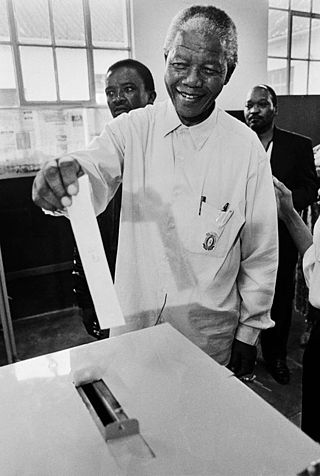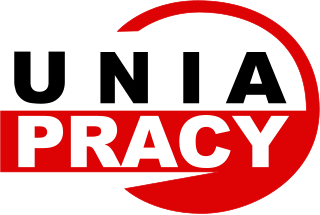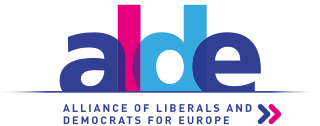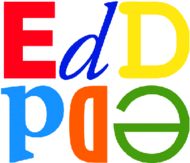
Democracy is a system of government in which state power is vested in the people or the general population of a state. Under a minimalist definition of democracy, rulers are elected through competitive elections while more expansive definitions link democracy to guarantees of civil liberties and human rights in addition to competitive elections.

The European People's Party Group is a centre-right political group of the European Parliament consisting of deputies (MEPs) from the member parties of the European People's Party (EPP). Sometimes it also includes independent MEPs and/or deputies from unaffiliated national parties. The EPP Group comprises politicians of Christian-democratic, conservative and liberal-conservative orientation.

Union for Europe of the Nations (UEN) was a national–conservative, Eurosceptic political group of the European Parliament active between 1999 and 2009.

Labour Union is a minor social-democratic political party in Poland. It was a member of the Party of European Socialists (PES) until April 2022.

The Reformist Movement is a liberal French-speaking political party in Belgium. MR is traditionally a conservative-liberal party, but it also contains social-liberal factions.

Christian democracy is a political ideology inspired by Christian social teaching to respond to the challenges of contemporary society and politics.

The Democrats of the Left was a social-democratic political party in Italy. Positioned on the centre-left, the DS, successor of the Democratic Party of the Left (PDS) and the Italian Communist Party, was formed in 1998 upon the merger of the PDS with several minor parties. A member of The Olive Tree coalition, the DS was successively led by Massimo D'Alema, Walter Veltroni, and Piero Fassino, and merged with Democracy is Freedom – The Daisy and a number of minor centre-left parties to form the Democratic Party in October 2007.

The Democratic Party is a Greek-Cypriot nationalist, centrist political party in Cyprus founded in 1976 by Spyros Kyprianou.
Liberal Democracy of Slovenia is a social-liberal political party in Slovenia. Between 1992 and 2004, it was the largest party in the country. In the 2011 Slovenian parliamentary election, it failed to win entry to the Slovenian National Assembly. The party was a member of the Liberal International and the Alliance of Liberals and Democrats for Europe.
G17 Plus was a centre-right political party in Serbia. Founded as a non-governmental organization dealing with economic issues, in 2002 it transformed into a political party that became part of several ruling coalition governments in Serbia throughout the 2000s and early 2010s. In 2013, it merged into United Regions of Serbia.
The Social Democracy of Poland is a social-democratic political party in Poland.

The League of Polish Families is a social conservative political party in Poland, with many far-right elements in the past. The party's original ideology was that of the National Democracy movement which was headed by Roman Dmowski, however, in 2006 its leader Roman Giertych distanced himself from that heritage.

A European political party, known formally as a political party at European level and informally as a Europarty, is a type of political party organisation operating transnationally in Europe and within the institutions of the European Union (EU). They are regulated and funded by EU Regulation No. 1141/2014 on European Political Parties and European Political Foundations and their operations are supervised by the EU Authority for European Political Parties and European Political Foundations. European political parties – usually consisting of national parties, not individuals – have the right to campaign during the European elections, for which purpose they adopt manifestos outlining their positions and ambitions. Ahead of the elections, some of them designate their preferred candidate to be the next President of the European Commission. In the European Parliament they work with more or less corresponding political groups and their MEPs. Europarties influence the decision-making process of the European Council through coordination meetings with their affiliated heads of state and government. They also work closely and co-ordinate with their affiliated members of the European Commission.

The European Democratic Party, also known as the European Democrats, is a centrist European political party in favour of European integration. François Bayrou is the party's president.

Democracy is Freedom – The Daisy, commonly known simply as The Daisy, was a centrist political party in Italy. The party was formed from the merger of three parties within the centre-left coalition: the Italian People's Party, The Democrats and Italian Renewal. The party president and leader was Francesco Rutelli, former mayor of Rome and prime ministerial candidate during the 2001 general election for The Olive Tree coalition, within which The Daisy electoral list won 14.5% of the national vote.

The Italian People's Party was a Christian-democratic, centrist and Christian-leftist political party in Italy. The party was a member of the European People's Party (EPP).

The Network, whose complete name was Movement for Democracy – The Network, was a political party in Italy led by Leoluca Orlando.

The Group of the Alliance of Liberals and Democrats for Europe was the liberal–centrist political group of the European Parliament from 2004 until 2019. It was made up of MEPs from two European political parties, the Alliance of Liberals and Democrats for Europe Party and the European Democratic Party, which collectively form the Alliance of Liberals and Democrats for Europe.

Europe of Freedom and Democracy (EFD) was a Eurosceptic political group in the European Parliament. The group was formed following the 2009 European parliamentary election, mostly composed of elements of the Independence/Democracy (IND/DEM) and Union for a Europe of Nations (UEN) groups that had existed during the 6th European Parliament. The group had a loose relationship with Movement for a Europe of Liberties and Democracy (MELD), a European political party founded in 2011.

The Progressive Alliance of Socialists and Democrats (S&D) is the political group in the European Parliament of the Party of European Socialists (PES). The Progressive Alliance of Socialists and Democrats was officially founded as a Socialist Group on 29 June 1953 which makes it the second oldest political group in the European Parliament after Renew Europe (Renew). It adopted its present-day name on 23 June 2009. Centre-left in orientation, the group mostly comprises social-democratic parties and is affiliated with the Progressive Alliance and Socialist International.

















